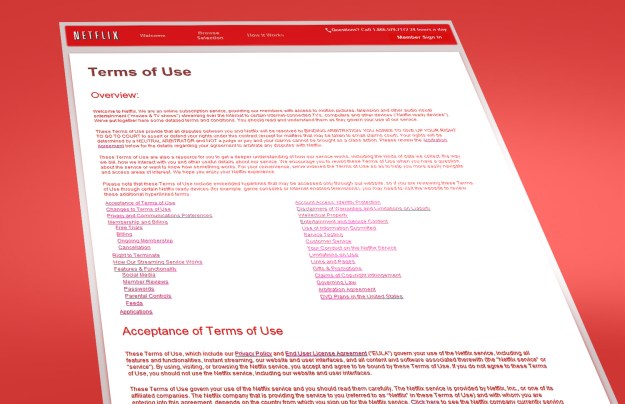
Netflix this week finally rolled out a feature it’s hoped to have for years: Facebook integration, and all the video history sharing that goes with it. Once you link your Netflix account with Facebook, you’ll be able to see videos recently watched and highly rated by your friends – they, in turn, will see your video history. And everyone will rejoice in the newfound ability to find new content to watch.
While we’ve covered Facebook’s Data Use policy before, Netflix’s remained a mystery – until today. Here is the lowdown on Netflix’s Terms of Use.
Terms of Use
Netflix takes an interesting approach to its terms. The document starts out as any other; your eye is drawn to a nice block of links that will take you to specific sections of its terms, as well as supplementary documents – all good. But in the second paragraph, Netflix comes out blazing with “These Terms of Use provide that all disputes between you and Netflix will be resolved by BINDING ARBITRATION. YOU AGREE TO GIVE UP YOUR RIGHT TO GO TO COURT.”
Jesus Christ, Netflix. Calm down. Give us a minute to get into this thing before smacking us across the face with talk of binding arbitration. I mean, what gives? We weren’t planning to sue you anyway.
So, there’s that – by using Netflix, you give up the right to sue Netflix (in states that honor binding arbitration provisions.) With that bit out of the way, let’s get on with the rest of the terms.
Sharing passwords
Let’s just get this one out of the way up front: Netflix does not explicitly prohibit you from sharing your password with “other members of the household,” which you can interpret however you like. It does, however, state that, as the account holder, you are entirely responsible for whatever the people who have access to your account do with it.
Chain, chain, change
One of the things consumer rights types look for in terms of service is a provision that says, basically, “we reserve the right to change these terms at anytime, so read them often.” Most people don’t even read them once, so subsequent changes are beyond virtually everyone. Netflix has this provision, which is bad. The good news is, it also has a page that lists every change ever made, which is great. Nobody’s going to read them, of course. But we appreciate the effort.
Nothing is free (except this)
Netflix sometimes offers free trials. If you sign up for a free trial, you’ll still have to put in your credit card, which seems like a scam. But fear not: the company’s terms clearly state – in all capital letters – that “If YOU CANCEL PRIOR TO THE END OF YOUR FREE TRIAL, THERE WILL BE NO CHARGES TO YOUR PAYMENT METHOD.” See? Nothing to worry about…
Once you are a paying customer, however, know that you cannot get a refund after the payment goes through. Nor will Netflix credit your account if you cancel midway through a month for which you’ve already paid.
Cancel anytime
Speaking of canceling your account, Netflix allows you to cancel your account at anytime. This may not seem worth mentioning, but this is not always the case. Facebook, for example, makes it extremely difficult to delete your account. And plenty of video games do the same, like Minecraft, World of Warcraft, or various other “craft” games.
To get rid of Netflix, just click “Cancel Membership” on the “Your Account” page.
It goes the other way, too
Just as you may cancel your account at anytime, so too may Netflix cancel your account for you – at anytime, for any reason, or for “no reason whatsoever.”
This is one of my most despised provisions – you see it all the time – and I think it should die a quick death in some Louisiana Swamp. That said, Netflix has no incentive to just start canceling accounts for the hell of it – doing so makes no sense, business-wise. But if your account is ever cancelled, know that you’ve agreed to let Netflix do just that before you call up to bitch out a customer service rep.
Performance boost
The bulk of Netflix’s terms of use is an 11-paragraph explanation of “How Netflix Works.” But for most people, anything of any real importance boils down to two key bits:
1. You can authorize your account on up to six devices (unless you upgrade your account), and you can stream content on up to two devices simultaneously.
2. Netflix isn’t responsible for the quality of the devices you use to access its service. So if you’re using some cheap Blu-ray player you bought at Walmart, don’t come crying to Netflix when it sucks.
Socialize
As mentioned above, it’s now possible to link your Netflix and Facebook accounts. Netflix has crafted an entire separate “Social Terms” document to deal with this. But you can probably guess what it says: Your Neflix data will be shared with Facebook, and vice versa. If you link your Facebook account when you sign up for Netflix, it will import your name, profile picture, and contact info automatically. So if you don’t want your data spread even further into the digital ether, don’t link your accounts.
In addition to sharing your data with Facebook, Netflix’s Privacy Policy says that it can share your info with other third parties – like law enforcement – or in the event that it buys another company, or is bought by another company. And it doesn’t have to tell you when it does so.
Reviews are public
When you write a review of a Netflix show or movie, everything you say in the review is public. So don’t reveal any personally identifiable information. And if you do, Netflix isn’t responsible for the consequences.


